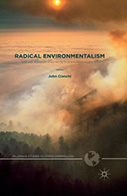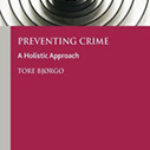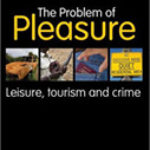RADICAL ENVIRONMENTALISM: NATURE, IDENTITY AND MORE-THAN-HUMAN AGENCY

Author: John Cianchi
Publisher: Baskingston, Oxon, UK: Palgrave, 2015, 163 p.
Reviewed by Michelle L. Lute | January 2018
Defending nature is a complex and sometimes dangerous endeavor. This year alone, we have seen 153 environmental activists murdered on three continents. Two hundred activists were killed in 2016, according to the Guardian. Defending nature in a time when corporations are considered people, but forests and whales are not, challenges not only those on the frontlines but also our notions of what is criminal. In Radical Environmentalism: Nature, Identity and More-Than-Human Agency, John Cianchi explores the processes by which radical environmentalists come to understand, connect, communicate and fight for nature.
Following two groups of activists, those defending forests from loggers in Tasmania and those defending whales from whalers in the Southern Ocean, Cianchi is an author as comfortable quoting Edward Abbey as he is Stephen Kellert and weaves seemlessly between two styles of writing. To tell the activists’ stories as directly as possible, he employs a narrative form of inquiry with excerpts from intimate interviews that occurred in old growth forests of Tasmania and on boats docked after weeks in the Antarctic Ocean. Readers will benefit from story-telling as told exactly by activists. How does it feel to be in communion with a forest only to watch it felled? The stories of grief and connection in this book help the reader understand the motivations and experiences of activists on the frontlines.
The author also uses socio-scientific writing to root the work in disciplines from green criminology to environmental sociology and dedicates much text to explaining his methodological approaches. Together, the reader is taken through the process of qualitative research that explores and interprets what the activists’ stories say about their self-identity in a community of radical environmentalists and their meaning-making of experiences in connection and communication with nature. Non-academics, students and researchers more familiar with quantitative approaches will all find this book approachable and helpful for understanding new methodologies and inquiries.
Perhaps the book’s greatest contribution is toward greater understanding of more-than-human agency in an era of ever-expanding moral communities and inclusivity. From marginalized human populations to rivers and chimpanzees, societies are still awakening to recognize rights of personhood and grant moral consideration to those considered “other”. Cianchi’s Radical Environmentalism helps bridge the gap by exploring how some activists perceive their interactions with nature as an active entity-not as humans above, outside or exceptional to a passive nature.
This book could not come at a more appropriate time. This year, we witnessed waves of de-democratization in nations across the globe. As democracy is defended and redefined, frontline activists in social and environmental justice movements can be more powerful once we recognize we are commonly allied against injustice. Direct action may become an increasingly important tool for fighting injustice in myriad contexts. The stories and lessons contained in this book help us explore not only how people come to be radical environmentalists and how direct action influences their identity and advocacy but also how individuals and grassroots movements can help redefine what is right and wrong, what is criminal and what is human.
Michelle Lute is the Wildlife Coexistence Campaigner for WildEarth Guardians


